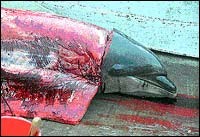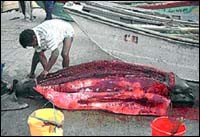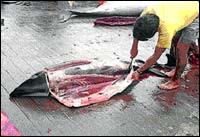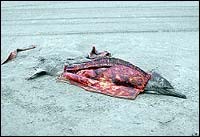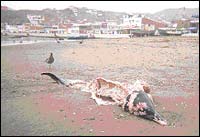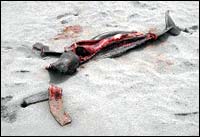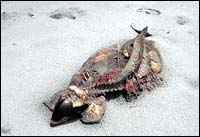|
Illegal hunting for human consumption kills 1000 or more dolphins per year in Peru!
Mundo Azul
Lima, Peru; Based on preliminary field reports the Peruvian NGO Mundo Azul (Blue World) estimates that illegal hunting of dolphins for human consumption kills at least 1000 dolphins per year along the Peruvian coast.
"There are very clear indications for a flourishing black market for dolphin meat in Peru", says Stefan Austermühle, biologist and Executive Director of Mundo Azul. He explains: "In order to stop illegal killing we initiated an awareness campaign that informs people about the ongoing problem of dolphin killing, explains why dolphins have to be protected and gives advice how to act if being witness of illegal activities."
The hunting and killing of dolphins, as well as the sale of dolphin meat and its consumption was prohibited by Peruvian law in 1995 as a result of dramatic increase of dolphin hunting during the 80s and early 90s in Peru, that mounted in an estimated 15,000 to 20,000 dolphins being killed each year. The law and a strong awareness campaign of Peruvian NGO´s resulted in the complete stop of sales of dolphin meat in supermarkets and restaurants.
"For years the problem was thought to be solved", says Stefan Austermühle: "the truth is, it is not." Reports and photographic material collected by Mundo Azul from places all along the 3000 kilometre long desert coast show clearly that illegal dolphin hunting is not an occasional event, but a widespread practice. In one beach in the northern limits of the coastal department of Lambayeque members of Mundo Azul found more than 20 dolphins killed for human consumption in one single day.
On another beach south of the harbor town Chimbote within one week, three dolphins being cut into pieces had been washed on the shore. "The problem is not restricted to isolated beaches, being hard to control. Last September we had the case of a dolphin found on the beach of the harbor town of Pucusana, 5 meters away from the fishing dock and 50 meters away from the office of the port authorities.
This shows," explains Austermühle, "that the killing of dolphins is still seen as a peccadillo by port authorities, fishermen and clients of this black market." Mundo Azul has also collected reports of dolphin meat being offered in restaurants and on high-society-parties in Lima.
In order to fight illegal dolphin killing Mundo Azul has started a national awareness campaign for the conservation of dolphins. Thanks to the financial support of the Swiss "Working Group for the Conservation of Cetaceans" (ASMS) and the mayor of Pucusana Mundo Azul was able to distribute information material to every household in Pucusana, using the opportunity to engage in direct dialogue with the local fishermen.
The NGO will continue now to distribute the material to public institutions and fishermen associations throughout the country.
The direct face-to-face-approach of the campaign is accompanied by a strong media campaign and a set of detailed information in English and Spanish on the laws protecting dolphins in Peru on the web site of
Mundo Azul (http://www.peru.com/mundoazul).
Visitors of the site will also find clear advice how and where to file official complains if one witnesses illegal action, how to support the campaign and what to do if a dolphin was found alive on the beach.
"In a situation where public and private funds are insufficient to efficiently control the Peruvian coast, we believe it is crucial to enable the average citizen to support the conservation of dolphins and to file official complains if he detects illegal killing, sale or consumption of dolphin meat," explains Austermühle and concludes: "So far our campaign was a full success and we are now hoping to find additional funding to continue the campaign throughout the year and add further activities like environmental education programs in public schools."
For further information, photographs or in order to support Mundo Azul’s campaign, please contact:
Stefan Austermühle
Executive Director of Mundo Azul
|
